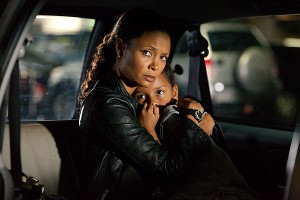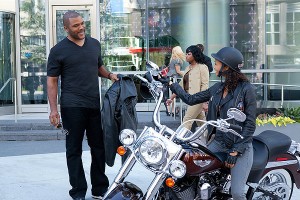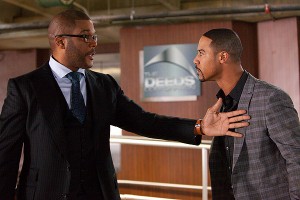
With Tyler Perry’s Good Deeds, writer/producer/director/star/studio-owner/name-in-the-title (does this make him a double-triple threat?) Tyler Perry has made probably his slickest movie to date—and I say this as someone who has seen all 12 of them. (Yes, I know he didn’t direct the first one, but I don’t think it changed who was in charge.) This latest one certainly lacks the ambition, the emotional resonance and the incredible outbursts of pure wrong-headedness found in his For Colored Girls (2010), and the loss of the first two elements makes me question whether the slickness is a good thing. You see, Perry hasn’t so much made a better movie with Good Deeds as much as he has gotten perilously close to a level of Hollywood mediocrity. However dubious Mr. Perry’s earlier efforts have been, they have at the very least been honestly and distinctly his.

Several things set Good Deeds apart. It’s the first of his self-originated films not to be set in Atlanta, or at least in the South (For Colored Girls had its setting built in), though I suspect that much of the film was shot “back home” and not in its San Francisco setting. More striking is the complete absence of any even passively religious material. No one so much as goes to church, and apart from the occasional “Oh, my God,” the deity is never referenced in any form. And with that—not to mention Perry as the male lead in this outing—we lose the frequent resolution to most of Perry’s films, which is that all a woman needs is a good, hunky guy and Jesus. Whether any of these changes are improvements is a matter for debate, and how they will play to his core audience will be told by the box office. (Don’t worry, there’s a new Madea picture in the making.)

In essence, Perry here gives us his “modern” version of a 1930s Frank Capra film (I suspect the name Deeds is a reference to Capra’s 1936 film Mr. Deeds Goes to Town)—and it’s about as unrealistic. It’s one of those things where the rich fellow learns the real meaning of life by rubbing shoulders with the hoi polloi—one of the prettier hoi polloi of the female persuasion, of course. To this end, we find Wesley Deeds (Perry), a rich, upperclass businessman from a long line of upperclass businessmen (actually, the script is a little fuzzy on this lineage). His life seems very appealing—and very mapped out by his mother (Phylicia Rashad), right down to a suitable hand-picked fiancée, Natalie (Gabrielle Union). Oh, sure he has an obnoxious, hot-headed brother, Walter (TV actor Brian White), who thinks he should be running the family business, but, all in all, things seem right on track. Until, that is, Wesley meets single mom Lindsey Wakefield (Thandie Newton) and her daughter, Ariel (Jordenn Thompson). In typical movie fashion, all it takes is them meeting cute and her putting him in his place for “not living in the real world” before he’s hooked.

There’s nothing here you haven’t seen before—lots of times—but it’s competently done, and in some cases, nicely done. Perry’s refusal to make Natalie into an unlikable character is a pleasant tack, and, in fact, the scene where they throw each other over is probably the best thing in the film—certainly it’s the most moving thing in the film. None of it is subtle, and all of it’s on the protracted side (Perry’s lackadaisical pacing seems ingrained in his work), but in terms of Perry’s oeuvre it’s surprisingly light on the cheesy melodrama. The only character who is absurdly over-written is Walter (whose last-minute contrition is even more absurd), and the only scene that topples over into unintentional laughs is the big confrontation where all the main players end up in an elevator. Is it a good film? Not exactly, but it is pleasantly watchable—and it’s certainly more interesting in connection with Perry’s overall filmography. Rated PG-13 for sexual content, language, some violence and thematic material.




I’m excited to read your eventual book of Tyler Perry criticism. I say that without irony.
It has actually been suggested by others — without irony. I don’t know how I feel about that.
Russell, Burton and Perry.
When you put it like that…